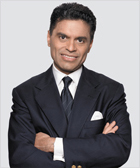
“Americans are going to have to adjust to a new reality” was the take-home message from journalist Fareed Zakaria ’86, who took part in a discussion with President Richard C. Levin on September 20 at the Whitney Humanities Center. The event was part of the celebration launching the Jackson Institute for Global Affairs.
Zakaria is editor-at-large at Time, and host of his own CNN show. He is also a Yale trustee.
In a switch of roles, it was Levin who interviewed the journalist. The president opened the talk with a question about the war in Iraq, pointing out that Zakaria had supported the war before turning against it.
Zakaria noted that during the early stages of forging relations between the U.S. and China, statesman Henry Kissinger asked Zhou Enlai what he thought about the French Revolution — to which the Chinese premier answered, “It’s too early to tell.” So too, Zakaria said, it might be too soon to deliver the postmortem on our military venture in Iraq.
“Right now it looks like the costs outweigh the benefits,” he said, “but maybe in the long run that will change.”
According to Zakaria, the U.S. military presence in Afghanistan far outbalances the threat from Al-Qaeda there — with more than 150,000 U.S. troops pitted against “at most” 500 active members of the terrorist organization. We should, he advised, keep perhaps 30,000 to 40,000 troops on the ground in Afghanistan, while we use counterterrorist intelligence and special forces to keep Al-Qaeda on the run.
Zakaria sees Iran and Turkey, neither of which is ethnically Arab, as the two superpowers vying with each other for supremacy in the Middle East, and he contends that Palestine remains a pawn in the game of Middle Eastern power politics. While Zakaria cited the adage “No one ever went broke betting against peace in the Middle East,” he said he is convinced that, as a democratic state, Israel will eventually accept a peaceful co-existence with its Palestinian neighbors.
Talking about the Far East, Zakaria offered the most cautionary picture of American prospects. China’s economy has been growing exponentially, he noted, and the Chinese government has been strategically positioning itself across the globe to maintain access to the resources it needs to keep growing. India is a natural ally to the United States, he said, and is also a growing superpower, but with internal problems of its own-a sizable Communist minority, for one. It is not on the same economic trajectory as China, Zakaria contended.
“Our best bet is with China,” he said, recommending partnership rather than protectionism for a long-term trade strategy.
Zakaria also noted, “We live in an increasingly competitive global landscape, and I don’t think we as a society are sufficiently attuned to that.”
The journalist cited statistics showing that the United States is falling behind, most alarmingly in the field of public education. “We have an unemployment rate, if you count all the jobless people who no longer collect unemployment benefits, of about 15%, and, at the same time there are over five million jobs that can’t be filled, because no one in our workforce has the necessary skills to do them,” he said.
Zakaria said he gives President Obama “two cheers” for averting a second Great Depression and restoring “civility” to the banks, but chides Obama for not being able, or willing, to put his good ideas into action.
“Not enough people in the White House know how to get things done,” he contended. Pointing to America’s diminishing preparedness for the new world order, Zakaria also said of Obama, “He just doesn’t get the urgency with which we have to hustle.”
The alumnus noted that he does not foresee a bleak economic future for today’s Yale students, but added that, as leaders, they will face many social and political challenges at home.
“The politics of a world with a collapsing middle class are not going to be pretty,” he predicted.
